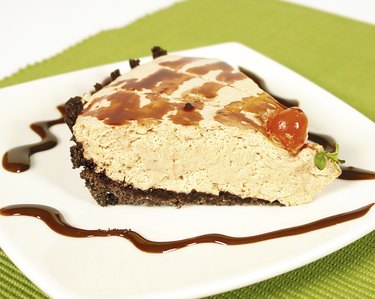
Eating a high-calorie diet can have many effects on your body, depending on the type of high-calorie diet you are consuming. In some cases, doctors and nutritionists may prescribe high-calorie diets for extremely active athletes or people who need to gain weight. In those cases, high-calorie diets serve a purpose that can help improve one's health. For a person with an average metabolism and activity level, however, high-calorie diets may have a deleterious effect, even if you are eating highly nutritious foods.
Weight Gain
Video of the Day
A calorie is a measure of heat energy. Calorie counts measure the amount of energy food supplies to your body. Your body converts food into energy via metabolism. Everyone has a basal metabolic rate, which is the rate at which your body burns calories to sustain the daily processes of living such as circulation, growth, cell repair and respiration. Two other factors determine how many calories your body burns. The first, thermogenesis, is the amount of energy your body expends digesting and processing the foods you eat. The second factor is your physical activity level. The more sedentary you are, the fewer calories your body expends in activity. Weight gain from a high-calorie diet is a function of thermodynamics. If you eat more calories than you burn via daily living, thermogenesis and physical activity, then you will gain weight.
Video of the Day
Changes in Body Composition
If you are eating a high-calorie diet with more calories than you burn, then your body must do something with the extra energy from food. Your body has two choices. It can either excrete the energy or store it in fat cells for future use. According to Gary Taubes, author of "Good Calories: Bad Calories," when insulin is present, your body chooses fat storage because insulin is a storage hormone that escorts unused fuel into fat cells. The result is an increase in body fat percentage.
Increased Risk of Certain Diseases
To eat a high calorie diet, you need to either consume high-calorie foods or eat very large amounts of low-calorie foods. Both types of eating place a great deal of stress on the body. High-calorie foods tend to be high in fats and/or sugars. High intake of these foods increases your risk factors for type 2 diabetes, heart disease and certain cancers. Eating a large amount of food stresses your digestive processes. Mouse and monkey studies, published in the January 2009 issue of Toxicologic Pathology, provide some evidence that the stress placed on the body by eating a lot of calories may decrease longevity, and restricting calories may increase it.